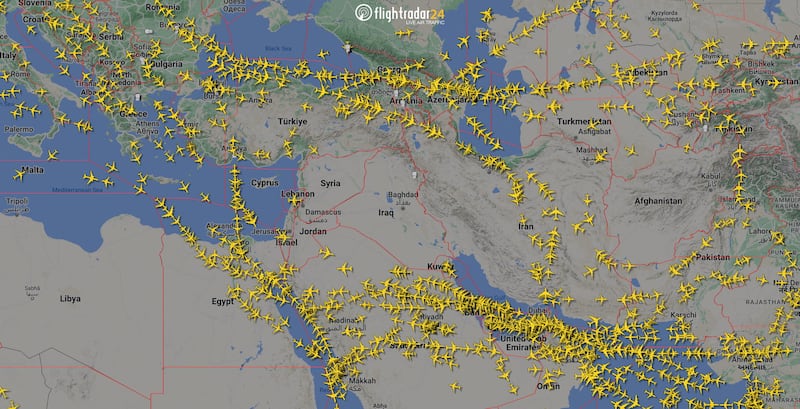Airlines in the Middle East have resumed flights to several destinations in the region.
Etihad Airways is once again flying to Amman, Beirut and Tel Aviv from Abu Dhabi, with flights resuming on Monday.
The national airline of the UAE cancelled and rerouted flights on Sunday after Jordan, Israel, Lebanon and Iraq temporarily closed airspace due to rising tensions between Iran and Israel.
Live updates: Follow the latest on Israel-Gaza
Travellers flying in the region today should be aware that there may still be delays or disruptions.
“As services return to normal following disruption caused by the temporary closure of airspace across parts of the Middle East on Sunday 14 April, there may still be a risk of some knock-on disruption across Monday 15 April,” a representative for the airline told The National.
Emirates has resumed normal operations after cancelling and rerouting some flights on Sunday. The Dubai airline is once again flying to Jordan, Lebanon and Iraq, after these countries lifted airspace restrictions.
“With the reopening of these airspaces, we are resuming our scheduled operations to/from Jordan, Lebanon, and Iraq from the afternoon of April 14,” an airline representative told The National.
“We are closely monitoring the situation in co-ordination with the relevant authorities. Safety is always our top priority. Customers can check their flight status on emirates.com for the latest information.”
A Flydubai representative said in an emailed statement that “flights are operating to schedule” and Qatar Airways resumed flights to destinations in the region, including to Amman, Beirut and Baghdad, according to a statement from the Doha-based airline.
Flights cancelled and rerouted
Over the weekend, several UAE airlines were cancelling and rerouting flights as tensions between Iran and Israel escalated.
Emirates, Etihad Airways and flydubai scrapped some flights and rerouted others after Jordan, Israel, Lebanon and Iraq temporarily closed airspace in light of Iran's attack on Israel.
Etihad, the national airline, cancelled flights to Tel Aviv and Amman on Sunday.
It rerouted a number of European and North American flights to avoid closed airspace in the region.
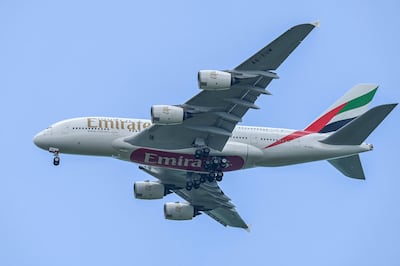
“Etihad Airways flights only operate through approved airspace. Safety is always our highest priority and we would never operate a flight unless it was safe to do so,” a representative for the airline told The National.
Flydubai cancelled several flights on Sunday.
“Due to the temporary closure of a number of airspaces last night, some of our flights on Sunday 14 April to Iran, Iraq, Israel and Jordan have been cancelled,” a representative for the airline told The National.
“We continue to closely monitor the situation as the airspaces reopen and will make any amendments to our schedule accordingly.”
The airline confirmed it was “in direct contact with our passengers whose travel plans have been affected”.
Wizz Air Abu Dhabi cancelled its scheduled flight to Israel on Sunday morning and said the temporary closure of airspace in the region had affected other flights.
“All passengers affected by the schedule changes will be provided with rebooking or refund options,” a representative said. “The safety and security for our passengers, crew and aircraft remains our number-one priority. We hope that normality comes back to the region soon.”
Iran cancels flights from airports across the country
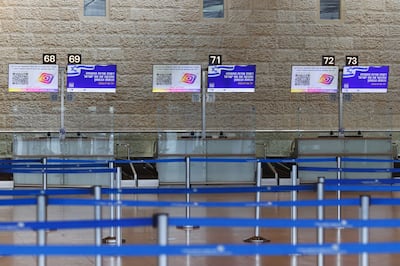
Airports in Iran suspended flights across the country until at least Monday, according to reports from Iranian state media.
This includes all flights from Tehran's Imam Khomeini International Airport.
It also applies to domestic flights from Mehrabad Airport and airports in Shiraz, Isfahan, Bushehr, Kerman, Ilam, and Sanandaj.
Where are diverted flights in the Middle East going?
As several countries in the region restricted airspace, flights heading to Europe or to the US had to be diverted, typically via Saudi Arabia and Egypt.
The change of flight path could add up to an hour to flight times for many passengers. As well as delayed journeys, this is likely to affect connecting flights in other destinations.
Planes that used to fly over Iran are also being diverted over Tajikistan and Pakistan, showing a change of pattern in the skies over the Middle East in a post shared by flight-tracking company Flight Radar 24.
Israel reopens airspace
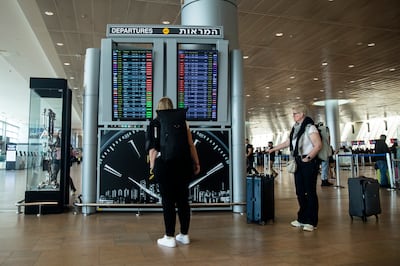
Initial airspace closures in Jordan, Iraq, Lebanon and Israel expired in the early hours of Sunday morning.
Israel's airspace reopened at 7.30am and an Arkia flight from the Seychelles was the first to land at Ben Gurion International Airport. Three El Al flights departed the airport on Sunday morning, with Israel's national airline bound for Prague, Athens and Larnaca.
Israel's airport authority on Sunday advised flight schedules at Ben Gurion would be subject to change.
Jordan has also reopened airspace, according to aviation authorities in the country. Samer Majali, chief executive of Amman airline Royal Jordanian, told Reuters the airline's flights have resumed but passengers could expect delays.
Iraq reopened its airspace on Sunday morning, with flights resuming across the country, and airspace in Lebanon reopened at 7am local time.
Middle East Airlines – Lebanon's national airline – announced on Facebook it was postponing most flights departing Beirut's Rafic Hariri International Airport.
What should affected travellers do?
Emirates advises customers departing or arriving at Dubai International Airport to check their flight status on emirates.com for the latest information regarding their flights.
It's best to do this before travelling to the airport.
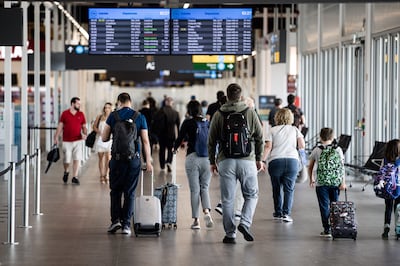
Etihad also advises travellers to check the status of any coming journeys on the airline's website. Passengers who want to change their travel plans in light of disruptions have been asked to reach out to the Etihad Airways Contact Centre, or to the travel agent with which they booked flights.
Travellers can also check any travel insurance policies owned to see what is stated with regards to coverage for flight cancellations due to airspace restrictions. Those with future travel plans in or through the region should continue to monitor the situation for developments, and reconfirm flight schedules ahead of travel.
International airlines suspend flights to the region
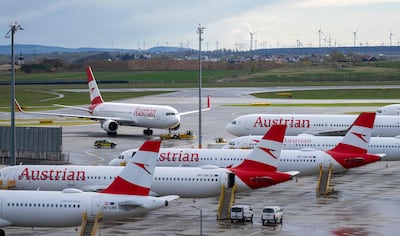
Austrian Airlines suspended all flights to Tel Aviv, Erbil and Amman on Sunday. The national airline of Austria and a subsidiary of the Lufthansa Group has scrapped flights to the three destinations until April 15.
The move comes after the airline previously canned flights from Vienna to Tehran until April 18. Austrian Airlines was the last western European airline still flying to Iran amid the escalating tensions.
Germany's Lufthansa has taken similar precautions, announcing on Sunday that it is suspending flights to Amman, Erbil and Tel Aviv until at least Monday. The airline has also suspended flights to Beirut and Tehran until Thursday, April 18.
On Saturday, Australia's Qantas said it would redirect long-haul flights between Perth and London to avoid Iranian airspace.
Travellers on the 17.5-hour flight, can now expect to stop in Singapore where the jet will refuel, before continuing on an alternative route. The return service from London to Perth will continue to fly non-stop on a readjusted path due to prevailing winds.
Follow regional developments on our live blog
